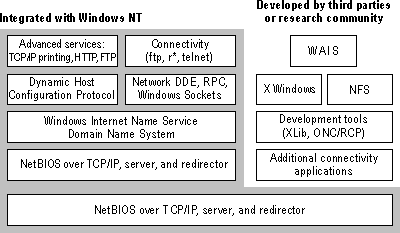Core Technology and Third-Party Add-Ons
Microsoft TCP/IP is a full-featured implementation of the protocol suite and related services. It includes the following:
- Core TCP/IP protocols, including the Transmission Control Protocol (TCP), Internet Protocol (IP), User Datagram Protocol (UDP), Address Resolution Protocol (ARP), and Internet Control Message Protocol (ICMP). This suite of Internet protocols dictates how computers communicate and how networks are interconnected. Support is also provided for Point to Point Protocol (PPP), Point to Point Tunneling Protocol (PPTP), and Serial-Line IP (SLIP), which are protocols used for dial-up access to TCP/IP networks, including the Internet.
- Support for network programming interfaces such as Windows Sockets, remote procedure call (RPC), NetBIOS, and network dynamic data exchange (Network DDE).
- Basic TCP/IP connectivity utilities, including finger, ftp, lpr, rcp, rexec, rsh, telnet, and tftp. These utilities allow users running Windows NT to interact with and use resources on non-Microsoft hosts (such as those running UNIX).
- TCP/IP diagnostic tools, including arp, hostname, ipconfig, lpq, nbtstat, netstat, ping, route, and tracert. Use these utilities to detect and resolve TCP/IP networking problems.
- Services and related administrative tools, including the Internet Information Server for setting up Internet or Intranet Web sites, Dynamic Host Configuration Protocol (DHCP) service for automatically configuring TCP/IP on computers running Windows NT, Windows Internet Name Service (WINS) for dynamically registering and querying NetBIOS computer names on an internetwork, Domain Name System (DNS) Server service for registering and querying DNS domain names on an internetwork, and TCP/IP printing for accessing printers connected to computers running UNIX or connected directly to the network with a dedicated network adapter.
- Simple Network Management Protocol (SNMP) agent. This component allows a computer running Windows NT to be monitored remotely with management tools such as Sun® Net Manager or HP® Open View. Microsoft TCP/IP also includes SNMP support for DHCP and WINS servers.
- The server software for simple network protocols, including Character Generator, Daytime, Discard, Echo, and Quote of the Day. These protocols allow a computer running Windows NT to respond to requests from other systems that support these protocols.
- Path MTU Discovery, which provides the ability to determine the datagram size for all routers between Windows NT-based computers and any other systems on the WAN. Microsoft TCP/IP also supports the Internet Group Management Protocol (IGMP), which is used by workgroup software products.
Figure 30.1 shows the elements of Microsoft TCP/IP alongside the variety of additional applications and connectivity utilities provided by Microsoft and other third-party vendors.

Figure 30.1 Microsoft TCP/IP Core Technology and Third-party Add-ons
Microsoft TCP/IP for Windows NT does not include a complete suite of TCP/IP connectivity utilities or server services (daemons). Many such applications and utilities — available in the public domain or from third-party vendors — are compatible with Microsoft TCP/IP.
Note
For computers running Windows for Workgroups, you can install Microsoft TCP/IP-32. For computers running MS-DOS, you can install the Microsoft Network Client for MS-DOS. Both are available on the Windows NT Server compact disc. For installation information, see the Windows NT Server Concepts and Planning book.

